RECOUNT OF REPORTED CASES OF HUMAN FASCIOLIASIS IN BRAZIL OVER THE LAST 60 YEARS
DOI:
https://doi.org/10.5216/rpt.v47i2.53636Keywords:
Trematode, parasites, Fasciola spp., public health, zoonosis.Abstract
Fascioliasis is an important anthropozoonotic disease caused by the ubiquitous trematode helminth, Fasciola spp. Here, as elsewhere, it is thought that the disease lacks proper reporting, and the available literature does not reflect unreported cases found in the Brazilian population, or new recently reported cases. The purpose of this work was to perform a recount of human fascioliasis (HF) cases in Brazil. For this, we considered all positive cases published in local and international official Journals, from 1950 to 2016. A theoretical-conceptual research method based on a systematic bibliographic review was applied to identify, select and index articles using the Endnote Basic Software. Here, only 48 cases of HF were found, of which 21 (43.7%) occurred in the South of the country. The small number of reported cases reflects the difficulty in diagnosing HF correctly (clinical and fecal tests). This work provides a real figure of HF reported cases in Brazil and has also corrected inaccurate information found in the literature by conducting a historical survey of the disease. Fasciola hepatica is highly endemic in ruminants and, hypothetically, the number of human cases should also be considerably higher than that reported in the literature. These findings call for more attention in regard to this neglected disease in Brazil.Downloads
Downloads
Published
How to Cite
Issue
Section
License
The manuscript submission must be accompanied by a letter signed by all authors stating the full name and email address, confirming that the material has not been published or is under consideration for publication elsewhere, and agreeing to transfer copyright in all media and formats for Journal of Tropical Pathology. The authors will not be paid for published articles. They are solely responsible for the content of those articles, even if the Editor holds the right to adjust them to the norms of the journal.
The reviewers will not be paid for the peer review process.

